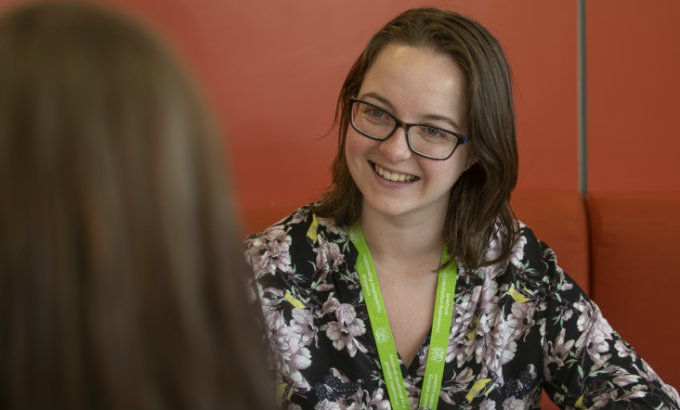When Fay Codona left university after nurse training two years ago, she had no idea she’d be back again so soon. But this time, she’s standing at the front of the lecture hall…
So how did Fay become a university lecturer, what is it really like and how can other students pursue a career in academia? We talk to her to find out
First of all, what was it that made you want to become a nurse?
I was coming to the end of my first degree in English Literature, I really had no idea what I wanted to do. Sadly, I had a bereavement in the family at that time and through that experience my eyes were really opened to the world of nursing. I knew then that I wanted to have a career like this, one that would bring me real satisfaction and also make a difference to people.
After becoming a registered nurse, what did you do?
After graduating, I took a job working as a general practice nurse. I thought that this was just the beginning of a long career working in practice for me, but then I happened to see that the University of Cumbria, where I studied, was advertising for a new adult nursing lecturer.
Had you already been thinking about working in higher education?
It was in my mind but as something I might do way down the line. Even when I applied for the job, I never thought I’d get it. I mainly thought it would be good to get experience of the interview process and a clearer idea of what I might need to do to work in that setting later on.
But you did get the job?
Well, actually, no! I didn’t get that one but one of my old personal tutors, who was on the interview panel, rang me up later to say that I should keep an eye out because another post was likely to become available and they would be keen to have me. And the second post I went for I did get.

Has it been a difficult transition, becoming a lecturer so soon after being a student nurse?
It’s been a huge learning curve. And of course there was some initial doubt from the students about my experience and ability to teach them, which was completely expected and understandable. But I think it has just been about acknowledging that and then going on to prove to them that I am a really passionate teacher and have a lot to offer.
Actually, I think that many of them now see having a teacher who has recently experienced the training they’re going through as a real plus. I know exactly what they’re going through and how stressful and overwhelming it can all be. And in a way, I’m like a glimpse of the near future for them and can say “I went through these same challenges but I made it out the other side, and you will too.”
Many students now see having a teacher who has recently experienced the training they're going through as a real plus
What’s the most rewarding part of the job?
It’s the little conversations. Those moments when a student comes to see me and wants to reflect on something they’ve read or seen on placement. That’s when you see their identity as a nurse coming to the surface and forming. It’s really nice to see.
Did you ever imagine a career in nursing could be so varied?
No, I had no idea really. When I first started studying, I saw nursing as far more of a narrow career choice than it actually is. I didn’t at that point see myself moving into academia, or even know that was an option.
But knowing that this world of higher education is open to me and I can have a different sort of nursing career has made me even happier with my choice. I’m proud to be a nurse and a teacher, and I can’t imagine being in any other sort of career now.
What does being a university lecturer really mean? Fay tells us what her typical day looks like
Well, to start, there really is no such thing as a typical day – or a typical week for that matter! Each day is so different, and even when you think you’ve got it all planned out, everything can change at the last minute.
As a student, your perspective of your lecturers and what they do comes from your contact time with them. You often won’t see what your lecturers are doing to support other students and each other and it can be easy to forget that you are not the only one they must make time for. As well as offering lectures, tutorials and one-on-one support meetings to several student cohorts from across all three years of the programme, there is also an awful lot that goes on behind the scenes.
Each of the lecturers in our team is attached to a different group of placement areas and we often visit these clinical settings to provide outreach to our students who are in practice; either just to check in and make sure they are doing OK or to offer targeted support where this has been identified as necessary. We are also responsible for auditing the placement areas that we are attached to. Marking and moderating assignments is also a huge part of our job and I must admit this takes up much more of my time as a lecturer than I expected!
We often come together as a team for meetings or training updates and we have recently set up a writing group, which is a space for us to discuss research ideas and encourage each other towards publication. At the University of Cumbria we strive to remain current to our students, and publishing is a great way to show that we are research active and influencing practice. We are a very supportive team and if one of us is sick or gets tied up unexpectedly, those of us who have the capacity will pull together to pick up the work.
To summarise, on any given day at work I could be visiting students to support them in practice, offering tutorials to small groups or individuals, preparing or delivering lectures or clinical skills sessions, marking or moderating assignments, attending training or update sessions, meeting with colleagues to discuss our writing or research….the list goes on!
And that’s not to mention all the unexpected things that can arise, such as a student coming to me in tears or having to deliver someone else’s lecture last minute.
Interested in a career in higher education? Here are Fay’s top five pieces of advice:
- Maintain your link with the academic world – this can be really difficult, especially when you have just finished a gruelling three-year nursing degree and have been released into the clinical world as a newly qualified nurse under immense pressure. But try to keep in touch with your lecturers, let them know you're interested in what they do and ask for tips.
- Get published – it doesn’t have to be in an internationally renowned academic journal. Come up with something you are interested in that you would like to write about, think about your target audience and then contact the editors of the appropriate publications (editorial team contact details are usually available on websites). If you ever come to interview for a lecturing position, being published will stand you in very good stead.
- Put the feelers out – look out for recruitment and open day events at the university or higher education institution (HEI) where you trained and offer to volunteer as an alumnus to talk to prospective students on the day. This will give you great experience of acting as a representative of a HEI and interacting with students, as well as an opportunity to network with current staff and keep yourself visible.
- Cast doubt aside – we all doubt ourselves at times, but if you know you want a career in higher education, just go for it. Don’t tell yourself you are too old or too young, you don’t have enough experience, or you’re not cut out for it. You are or have been a student nurse which is one of the most difficult journeys anyone can go through. You have already conquered more than most so have faith in yourself. Anything is possible.
- Take every available opportunity – even if you think you won’t be successful or aren’t sure what it will lead to, just try. It is all good experience and you never know what might come from it!
Your career development
Find out more about pursuing a role in education or the many other career options that could be open to you once you become a registered nurse by using the RCN's online careers resource.








